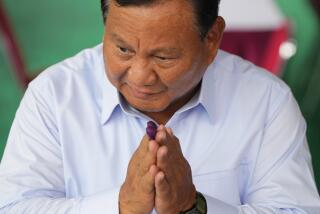Indonesia Vote Results May Put General in Race
- Share via
JAKARTA, Indonesia — As the slow process of counting votes in Indonesia’s parliamentary elections continued Wednesday, one presidential candidate emerged who could pose a formidable challenge to the reelection hopes of President Megawati Sukarnoputri.
With nearly 30% of the votes in Monday’s election tabulated, it appeared that the Democratic Party, headed by former security minister Susilo Bambang Yudhoyono, would exceed the 3% threshold required to nominate him for president -- putting a candidate in the race who has the potential to unite other parties behind him.
Yudhoyono is a retired four-star army general who has served as a Cabinet minister under two presidents, including Megawati. He is widely regarded as a capable leader who is untainted by widespread corruption in the government.
With 24 parties in the parliamentary race and none likely to win even a quarter of the votes, the presidential race will be shaped largely by party alliances that will be formed in the coming days.
“In less than one week there will be a new political map in Indonesia,” said Yudhoyono, who acknowledged meeting with representatives of several parties since Monday’s vote.
With more than 37 million ballots counted of an estimated 125 million cast, Megawati’s Indonesian Democratic Party in Struggle was barely leading with 21% of the vote. For Megawati, the tally represented a major setback -- her party appears to be losing a third of the support it had in 1999’s parliamentary election, when it received 34%.
Golkar, the party of the ousted dictator President Suharto, was close behind with 20%. The National Awakening Party of former President Abdurrahman Wahid was third with less than 14%.
Although Yudhoyono’s newly formed Democratic Party was in fifth place with less than 8%, many voters who backed other parties for parliament have indicated that they would support him for the presidency. Recent surveys indicate that he would be the front-runner in a contest with Megawati.
Under Indonesia’s election laws, parties that attract 3% of the vote may field a candidate in the July 5 presidential election. If no presidential candidate receives a majority in July, the top two will vie in a September runoff.
It will be the first time in Indonesia’s history that citizens will choose a president by direct election.
Megawati, the daughter of founding President Sukarno, took over in 2001 but has done little to address the country’s vast unemployment, the graft that permeates both government and industry and the rapid destruction of rainforest by legal and illegal logging.
She rarely speaks out on important issues, almost never answers questions from the media and is known to visit her father’s grave to commune with his soul for guidance. Her perceived lack of leadership has many Indonesians longing for the strong rule of Suharto -- the general who seized power from her father in 1965.
Yudhoyono’s credentials -- the former general is also a nationalist and a Muslim -- could give him broad appeal. At the same time, he is perceived as a deliberate decision-maker, soft-spoken and tolerant.
Yudhoyono served with the United Nations peacekeeping force in Bosnia-Herzegovina in 1995 and 1996. Under Wahid, he became minister of mines in 1999 and coordinating minister for security in 2000.
In 2001, Wahid, facing removal by the People’s Consultative Assembly, sacked Yudhoyono because he refused to use force to keep the president in power.
After Wahid’s ouster, Yudhoyono took the same security post in Megawati’s Cabinet. He quit that job last month, when it became clear that he planned to run for president and Megawati began excluding him from Cabinet meetings.
On both occasions, Yudhoyono’s departure from the Cabinet seems to have boosted his standing among voters. If he is elected president, Yudhoyono has pledged to fill his own Cabinet with professionals and experts rather than party functionaries.
More to Read
Sign up for Essential California
The most important California stories and recommendations in your inbox every morning.
You may occasionally receive promotional content from the Los Angeles Times.













